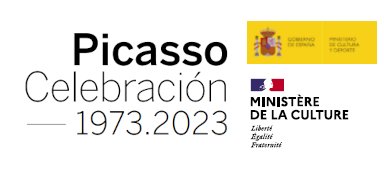
© Sucession Picasso, VEGAP, Madrid, 2023
Mercedes Compaposada Guillén was a film editor, art agent, writer and anarchist militant. She was the daughter of a working-class family, in which her father, José Guillén, was a militant in the Union General de Trabajadores (UGT). From him, she learned the importance of education in bringing about change in society. The writer attended graduate school, studied languages, and enrolled in law courses. She joined the National Confederation of Workers (CNT) union and taught in union halls. It was at this time that she became aware of the unequal valuation of men and women.
Faced with this reality, as Ignacio Soriano Jiménez explains in his biography published in the Royal Academy of History, she "formed, together with Lucía Sánchez Saornil and Amparo Poch y Gascón, part of the Madrid-based group Mujeres Libres, created with the aim of fighting for liberation from the triple slavery of women: from ignorance, as females (mainly in the home) and as producers, giving central importance to culture". The magazine Mujeres Libres was edited by women from the powerful libertarian movement, who sought, through education, reflection and denunciation, to give women a specific voice in the global struggle for equality and freedom of human beings.
During the difficult years of exile that began in 1939, Mercedes Guillén did not manage to escape imprisonment for a couple of months. Then, after the Second World War, she devoted herself to the translation into French of Spanish classics such as Arcipreste de Hita, Lope de Vega and Miguel Hernández. In addition to this, she worked as Pablo Picasso's secretary, and her meeting with the Malaga painter was an event that marked her life and inaugurated a friendship that lasted for decades.
It was during this time that the writer was able to get to know the artist in greater depth and wrote the book entitled Picasso, which was first published in 1973 by Editorial Alfaguara. These memoirs she wrote about her daily life with Picasso are not intended as a critique of his work, as she reflects in her own words: "That work corresponds to professionals, to art technicians. What I would like to do is to suggest, through my observations, however insignificant they may be, a truer Picasso than the one known superficially, a Picasso without grotesque disguises that do not correspond to reality, without the circus that is often staged around him" (Guillén, 1975).
In tune with and in the author's eyes, part of the collective Spanish feeling generated by Picasso's work is reflected in the following excerpt from her book published in: Picasso in Madrid: Jacqueline Picasso Collection:
"...To us Spaniards, what some people try to do or do with the same elements that Picasso has used seems false, it sounds to us like a falsetto, a searched-for and stilted thing, because they have only been moved by a formal need. In Picasso's work, this deepening is one of the healthiest and most vital aspects of his art.
For us Spaniards this is one of the most convincing reasons, the one that makes us reach his art intuitively, through emotion, through this penetration to the essentiality of everything. Without beating about the bush. Like the truth of bullfighting when he approaches the bull, the truth that he finds the necessary pass at every moment, that he invents it according to the bull, according to the bull's response. So one pass after another, infinite passes, infinite, improvised variety of passes that follow one after the other, that emerge. Approaching the bull requires clairvoyance, self-control in the face of danger, in this game of intelligence, of passion and knowledge - passion does not take away knowledge - of life and death, life or death. Approaching the bull, fighting the bull, dominating the bull, killing the bull is what Picasso does in his paintings, in a clean game, never a chafarrinón, always alert, with a clear conscience in his work, like the bullfighter in his performance, with understanding in that performance of his of brushstroke, of art..." (Guillén, 1975, as quoted in Torrente Larrosa 1986).
References:
- Guillén, Mercedes. Picasso. Madrid. Siglo XXI de España Editores, 1975.
- Soriano Jiménez, Ignacio C. Mercedes Compaposada Guillén. Real Academia de la Historia. Diccionario Biográfico electrónico (online: https://dbe.rah.es/biografias/56451/mercedes-comaposada-guillen).
- Torrente Larrosa, Aurelio. Picasso in Madrid: Jacqueline Picasso Collection. Ministry of Culture and Sport, 1986.

